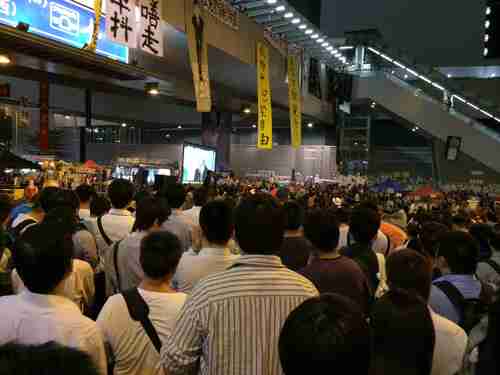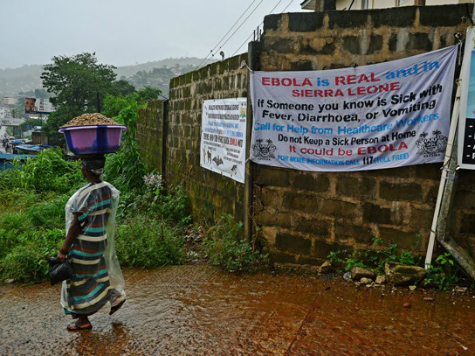
This morning’s key headlines from GenerationalDynamics.com
- Hong Kong leader suggests that the poor shouldn’t be allowed to vote
- Violent rioting breaks out in Sierra Leone town over Ebola case
- Health officials promote new ideas to curb Ebola deaths
Hong Kong leader suggests that the poor shouldn’t be allowed to vote

Hong Kong students watch televised debate on Tuesday evening (Finance Asia)
Hong Kong residents were promised fully free and fair electionswhen Britain returned the British colony over to China in 1997.China has consistently stalled on the promise, triggeringthe protests of the last few weeks. These protests have beenmostly peaceful, but there have been some clashes with policein the last few days.
Hong Kong’s Beijing-appointed leader Leung Chun-ying (CY Leung) made agaffe on Monday evening during remarks to reporters. In attempting toexplaining why free and fair elections would be a mistake, he said thefollowing:
If it’s entirely a numbers game and numericrepresentation, then obviously you’d be talking to the half of thepeople in Hong Kong who earn less than $1,800 amonth.
The implication, according to press reports, is that if poor peoplewere allowed to vote, then Hong Kong would turn into a welfare statewhere poor people would gain more influence in politics.
This remark is certain to infuriate protesters, as one of their issuesis that many Hong Kong families are poor because of deterioratingeconomic opportunities, and sustain one of the developed world’s largestwealth gaps. According to a protest leader, “It reflects the distrustthe authorities have of the people, and it also reflects how thecurrent political system is biased for the rich and against the poor.”
AFP and Diplomat and Finance Asia (Hong Kong)
Violent rioting breaks out in Sierra Leone town over Ebola case
Sierra Leone officials have imposed a curfew on an eastern town aftertwo people were killed in clashes between rioting youth and thepolice. The clashes were triggered when a health authorities tried totake away a 90-year-old grandmother suspected of having Ebola. Adispute erupted, resulting in gunfire and rioting.
As we wrote several days ago ( “19-Oct-14 World View — Forecasting the Ebola endgame and Global Risk”), the Ebola crisis is interacting with othergeopolitical issues, particularly causing instability wherever itappears. Things are probably going to get increasingly ugly in thenext few months. Reuters and BBC
Health officials promote new ideas to curb Ebola deaths
If you live in Liberia or Sierra Leone and you go to a hospitalbecause you think you might be coming down with Ebola, there’s a good chance that you’ll be turned away becausethere are no more beds available. You’ll have to return home,where your family will try to care for you, and may becomeinfected themselves.
Health officials are hoping that Ebola survivors can play a crucialrole in helping newly infected patients survive, thus bringing downthe 50-70% death rate.
The blood of an Ebola survivor will have antibodies that can fightEbola. Doctors can then take a sample of their blood and turn it intoa treatment called serum – by removing the red blood cells but keepingthe important antibodies – for other patients. Officials are sayingthat serum may be available in Liberia within weeks.
Survivors can become caregivers for newly infected patients, thussparing the patients’ family members from risking infection. It’sbelieved that Ebola survivors are henceforth immune to the Ebolavirus. However, some doctors say that this immunity is not 100%certain, since the Ebola virus may mutate into a different form thatdefeats the immunity.
One reason for the high death rate for Ebola is that patients becomedehydrated from sweating, diarrhea and vomiting. It turns out thatjust drinking water is not an effective way for a dehydrated patientto rehydrate, and it just increases the volume of diarrhea.
For this reason, low-cost packets of electrolyte rehydration salts arebeing made available throughout Liberia and Sierra Leone. When mixedwith water, these become an effective oral rehydration solution (ORS).
The problem with an ORS is that the patient has to drink about 5liters (quarts) of the ORS per day, and the ORS tastes awful. Forthat reason, most ORS solutions are treated with glucose, to create asweeter taste.
If a patient comes down with Ebola symptoms at home, taking an ORSright away, before the body becomes too dehydrated, is an effectiveway to increase the probability of survival. BBC and Pharmacy Times
KEYS: Generational Dynamics, China, Hong Kong, Leung Chun-ying, CY Leung,Sierra Leone, Liberia, Ebola, oral rehydration solution, ORS
Permanent web link to this article
Receive daily World View columns by e-mail

COMMENTS
Please let us know if you're having issues with commenting.